RECORDINGS WILL BE AVAILABLE FOR PURCHASE ON OCTOBER 31.
PROGRAM
SPEAKERS
SPONSORS
BECOME A SPONSOR
CONTINUING EDUCATION
Virginia Spielmann (she/her), PhD, OTR/L
 Executive Director
Executive Director
STAR Institute
USA
Host
Virginia is a well-travelled speaker, coach and educator on topics including sensory integration, DIR/Floortime, child development and infant mental health. She has conducted trainings in Kenya, Australia, the Philippines, Vietnam, Hong Kong, and the USA and leads workshops at international conferences.
Virginia is a founder and former Clinical Director of SPOT (Speech, Physical, and Occupational Therapy) Interdisciplinary Children's Therapy Center in Hong Kong, where she led a large and widely respected inter-disciplinary team.
Virginia obtained her BSc in Occupational Therapy in Oxford England (2002) and her Masters in Occupational Therapy from Mount Mary University, Milwaukee (2018). She is a DIR/Floortime Training Leader and Expert and clinical consultant for the Interdisciplinary Council for Development and Learning (ICDL). Her extensive pediatric experience includes children on the autism spectrum, as well as those with Sensory Processing Disorder, infant mental health issues, adoption, developmental trauma.
Virginia has considerable post-graduate training, she is certified on the SIPT and is currently completing her Ph.D. in Infant and Early Childhood Development with an emphasis on mental health, with Fielding Graduate University, in Santa Barbara. She is a published author and contributed to the STAR Frame of Reference as part of the 4th Edition of Frames of Reference for Pediatric Occupational Therapy, alongside Dr. Miller and Dr. Schoen.
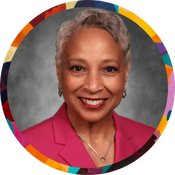
Brigit M. Carter (she/her), PhD, RN, FAAN
Chief Diversity, Equity, and Inclusion Officer
American Association of Colleges in Nursing (AACN)
USA
Dr. Brigit Carter, Chief Diversity, Equity, and Inclusion Officer, joined the American Association of Colleges in Nursing (AACN) in February 2023. She is Professor Emerita at the Duke University School of Nursing, where she served as the Associate Dean for Diversity and Inclusion from 2018-2023. From 2015-2018, she served as the Director of the DUSON Accelerated Bachelor of Science in Nursing (ABSN) program. Her current educational research is focused on understanding the experiences of students with microaggressions and the development of strategies to mitigate the impact of microaggressions. She focuses on strategies to increase historically marginalized students in nursing and understand individual-level social determinants that are barriers to achieving nursing education.
Dr. Carter is a Fellow in the American Academy of Nursing, an Atlantic Fellow for Health Equity, and a Duke Teaching for Equity fellow.
Dr. Carter retired from the U. S. Navy as a Commander after 28 years of service in January 2018.
From the Margins to the Center: The Journey Towards Belonging
This presentation explores the concept of belonging through the lens of individuals and communities who have experienced exclusion. It examines how systems of exclusion operate in society, institutions, and culture, and what it takes to move from exclusive environments to environments that foster genuine belonging. By centering lived experiences and actionable strategies, the presentation challenges participants to reimagine environments where everyone feels seen, heard, and valued. The session offers insights into shifting power dynamics, fostering equity, and building inclusive spaces that prioritize human dignity and connection.
After participating in this session, attendees should be able to:
- Describe the personal and collective impact of exclusion on participation and well-being.
- Identify patterns or practices that limit inclusion and belonging in organizational or community contexts.
- Recognize practical strategies to move beyond performative inclusion toward authentic belonging.
- Summarize ways to foster environments and relationships that support mutual respect and trust.
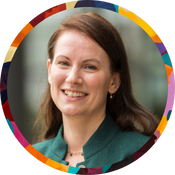
Karen Gravett (she/her), PhD
Associate Professor of Higher Education, and Associate Head (Research)
University of Surrey
United Kingdom
Dr Karen Gravett is Associate Professor of Higher Education and Associate Head (Research) at the University of Surrey, UK, where her research focuses on the theory-practice of higher education. She is a member of the Society for Research in Higher Education Governing Council, a member of the editorial board for Teaching in Higher Education, and Learning, Media and Technology, and Associate Editor for Sociology. She is a Principal Fellow of the Higher Education Academy. She is also an Honorary Associate Professor for the Centre for Assessment and Digital Learning at Deakin University. Karen’s latest books are: Gravett, K. (2025) Critical Practice in Higher Education, and Gravett, K. (2023) Relational Pedagogies: Connections and Mattering in Higher Education.
Understanding Belonging in a Changing World
In this presentation, I will share some of my recent research and practice thinking about key notions of connection and belonging, exploring how we might understand the complexity of these ideas in contemporary times. Specifically, I examine how university students’ and staff situated experiences of belonging and participation speak back to simplistic conceptions of equity, diversity and inclusion, and sketch a more nuanced depiction of what it is to experience moments of connection and belonging. During the presentation, I will explore how we can draw upon evidence-based research to assist our work in supporting connection, and I also offer ongoing directions for fostering belonging in practice.
After participating in this session, attendees should be able to:
- Define the concepts of belonging and connection and describe their relevance to health and participation.
- Identify diverse ways individuals may experience belonging and connection in healthcare and community contexts.
- Identify key stakeholders who can support belonging and describe strategies they may use.
- Describe the concept of non-belonging and its potential impact on well-being and occupational engagement.
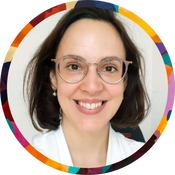
Livia Tomova (she/her), PhD
Assistant Professor in Psychology
Cardiff University
United Kingdom
Social connection is central for health and well-being in humans, especially during the formative developmental period of adolescence. How do experiences of social disconnection, such as social stress, loneliness and social isolation, impact the brain and mind of young people? And how does engagement with digital technologies, such as social media use, impact young people and their social relationships?
My research explores these questions using different methods such as behavioural experiments, neuroimaging in combination with multivariate analysis methods (e.g., multi-voxel pattern analysis, MVPA), and secondary analyses of large-scale longitudinal data.
My PhD research at University of Vienna (completed in 2016) focused on the effects of acute stress on social cognition and the underlying brain processes. My dissertation received the Austrian Award of Excellence for the best Austrian Dissertations in 2016. I then completed three years of postdoctoral training in Cognitive Neuroscience at MIT, investigating how the lack of social connection is represented in the human brain (Tomova et al. 2020, Nature Neuroscience). In 2020, I was awarded a Henslow Research Fellowship at Cambridge Universityduring which I studied the effects of isolation and loneliness on adolescent cognition. In April 2024 I started my position as Assistant Professor in Psychology at Cardiff University.
Outside of work, I enjoy spending my time with my 18 months old daugther and reading science fiction books.
Wired for Connection: How Isolation Derails Cognitive Growth in Adolescents
In this engaging and in-depth presentation, Dr. Virginia Spielmann engages in a thought-provoking conversation with Dr. Livia Tomova, a leading researcher exploring the profound effects of loneliness on the brain.
As we face ongoing challenges related to COVID-19 and social disconnection, this discussion is crucial for allied health care and education professionals.
Dr. Tomova explores the neuroscience behind what’s termed a "loneliness epidemic," examining the critical differences between loneliness, isolation, and solitude. She highlights how our brains are wired to seek social connection, offering insights that can enhance our understanding of fostering community for ourselves and the people we support.
Lovette Jallow (she/her) 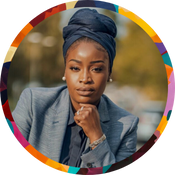
Author, Lecturer, Inclusion Strategist
Sweden
Lovette Jallow is a nine-time award-winning author, strategist, and global speaker specializing in neurodivergence, anti-racism, and structural equity. A Black autistic woman with lived experience across West Africa and Europe, Lovette brings a rare combination of critical insight, applied systems thinking, and lived expertise to institutions seeking to move beyond performative inclusion.
Her work spans sectors including humanitarian coordination, neurodiversity consulting, and cultural policy reform offering institutions tools to confront how race, disability, and power are embedded in diagnostics, education, and organizational design. She is the founder of Black Vogue, a platform that challenged the Eurocentric beauty industry and reshaped public discourse on racial representation in Scandinavia. Rather than a lifestyle project, Black Vogue served as a structural critique of how Black women are erased, regulated, and pathologized insights she expands in her published books, which are now used in academic and policy contexts.
Lovette is also the founder of Action for Humanity, an independent humanitarian initiative working across Sweden, The Gambia, Libya, and Lebanon to support refugee repatriation, anti-racism education, and advocacy for marginalized neurodivergent communities. Her lectures have been delivered at universities, international summits, and corporate institutions addressing how white supremacy, ableism, and structural neglect define mainstream inclusion frameworks.
She does not deliver awareness talks. She offers systems critique, evidence-informed tools, and strategies rooted in justice not compliance. Her work affirms that true inclusion requires not just access, but structural accountability.
Belonging by Design: Precolonial African Approaches to Collective and Neurodivergent Belonging
Reframing belonging as a structural practice, not sentiment. Drawing from precolonial African research on collective care and applying it to neurodiversity in health care today.
Belonging in 2025 cannot be reduced to inclusion rhetoric or surface-level diversity. For neurodivergent people, belonging is the ability to enter a system without masking, shrinking, or absorbing harm. This keynote draws on research into precolonial African societies that curated belonging through care circles, women’s councils for repair, and griot memory that preserved difference as continuity rather than deficit. These models demonstrate belonging as infrastructure: predictable roles, shared regulation, and collective accountability. I will then connect this to contemporary health care, where ableism, racism, and microaggressions unravel belonging when left unchecked. Attendees will leave with practical strategies to design belonging into clinical environments through repair protocols, sensory-aware pathways, and measurable indicators of safety and continuity.
After participating in this session, attendees should be able to:
- Explain belonging as a structural practice rather than a feeling.
- Identify precolonial African systems, documented in research, that cultivated belonging across difference.
- Apply neurodiversity-informed strategies such as care circles, narrative continuity, and co-regulation windows in health care settings.
- Recognize how microaggressions and everyday bias undermine belonging, and design repair mechanisms to address them.
- Measure belonging through practical metrics that support both patients and staff.
Amy Pearson (she/her), PhD 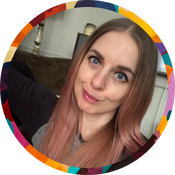
Assistant Professor
Durham University
United Kingdom
Amy is an Assistant Professor in Developmental Psychology at Durham University and a core member of the Centre for Neurodiversity & Development. Amy is an autistic researcher, and her work focuses on understanding factors which impact on positive outcomes among autistic and neurodivergent people across the lifespan, particularly interpersonal relationships and identity. In 2023, Amy was awarded the Rosalind Franklin Society Award in Science for her research which explored the interpersonal abuse among autistic people. Her most recent project, funded by the Violence, Abuse and Mental Health Network, explored the support and recovery needs of autistic victim-survivors of intimate violence and abuse. This work led to the development of An Autistic Guide to Healthy Relationships. Her work has been published in leading peer-reviewed journals, and she is on the editorial board for the journal ‘Neurodiversity’ (Editor), and Autism in Adulthood (Deputy Editor). Amy has extensive experience developing and delivering training for external organisations, including the Association of Child and Adolescent Mental health. She is the chair of North Tyneside Council’s Research and Evaluation group for the Neurodiversity Transformation Strategy.
Georgia Pavlopoulou (she/her), PhD
Associate Professor
BACP Registered Psychotherapist
University College London
United Kingdom
With over 20 years of experience supporting autistic individuals with and without learning disabilities and their families. Georgia brings deep expertise in co-creating inclusive support systems across clinical, educational, and research contexts.
Georgia served as National Strategic Lead and Programme Director of a £9 million NHS-funded initiative focused on improving service delivery for autistic people across mental health inpatient and community settings, residential schools and colleges, and youth justice services. The curricula developed under her guidance are now fully adopted by NHS and rolled out via NHS Future platform.
Georgia is also Co-Strategic Lead co-leading the strategic direction and governance (2024-2028) of a £1.95 million Neurodiversity in Schools programme at Anna Freud. The initiative drives trauma-informed, autism-inclusive practice to improve outcomes for autistic and ADHD children, young people, and school staff across the UK.
Georgia leads multiple UKRI and MRC-funded research work packages, which focus on improving mental health outcomes for neurodivergent adolescents and young adults:
🔹 Emotion Regulation & Depression Prevention : RESTAR (£3.3M)
Examining how to reduce the risk of depression in adolescents with diagnoses of autism and ADHD through early identification and support resource development.
🔹 Mental Health Resource Hub for Young People CREATE (£1.2M)
Creating a research hub that bridges art, science, and youth voice to explore adolescent loneliness and mental wellbeing.
Georgia is a passionate advocate for creative, participatory, and inclusive research. She believes in placing autistic and other neurodivergent people at the heart of decision-making, whether in therapy rooms, research design, or policy-making.
During the COVID-19 pandemic, her co-authored policy work, cited by the Policy Innovation and Evaluation Research Unit (PIRU), informed the development of the UK government’s Autism Strategy (2021–2026) to leverage voices of neurodivergent people and their family members.
Georgia is member of Editorial Board at Frontiers in Child and Adolescent Psychiatry Board as associate editor for Autism and Other Neurodevelopmental Disorders section. She served as guest Editor at Autism journal for a Special Issue on The social model of Autism Research and is the lead editor of Routledge's best seller book on "Improving Mental Health Therapies for Autistic Children and Young People :Promoting Self Agency, Curiosity and Collaboration.
Agency, Belonging, Collaboration: The ABC of Experience-Sensitive Practice
In this session, we will present data from multiple projects exploring experiences of belonging among neurodivergent young people. We will talk about how to move from 'including' young people, addressing barriers to belonging and creating truly welcoming spaces. We will address how issues like masking impact on the mental health and attainment of young people, and how we can create safer spaces for them to be themselves.
After participating in this session, attendees should be able to:
- Understand barriers and facilitators to belonging among neurodivergent young people
- Describe ways to increase belonging among neurodivergent young people
Amelia Nagoski (they/them)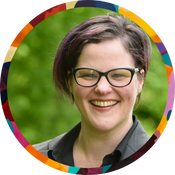 , DMA
, DMA
Author
USA
Amelia Nagoski, D.M.A. (it stands for Doctorate of Musical Arts) is the co-author, with her sister Emily, of the New York Times bestselling Burnout: The Secret to Unlocking the Stress Cycle and the Burnout workbook. Her job is to run around waving her arms and making funny noises and generally doing whatever it takes to help singers get in touch with their internal experience.
She lives in New England with her husband and two rescue dogs.
A Conversation on Burnout and the Communality of “Self” Care
In this lively and illuminating interview, Dr. Virginia Spielman sits down with New York Times best-selling author Amelia Nagoski, whose book Burnout: The Secret to Unlocking the Stress Cycle presents a fresh, fierce, and feminist approach to dealing with the emotional and psychological toll brought about by working in high-stress professions.
With humor and an incisive focus on systemic issues, Amelia offers transformative insights into prioritizing wellness alongside work. She also shares a delightful song related to burnout that enhances our learning experience—making it particularly relevant for those working in human-centered fields.
This conversation is equally vital for professionals in pediatric practice, where discussions about the stress cycle are often overlooked despite its significant impact. Amelia delves into the physiology of burnout and stress, providing valuable guidance for fostering resilience in both personal and professional lives. Join us as we explore how communal self-care can be a powerful tool against burnout in our demanding environments.
Gail Whiteford (she/her), BApp.Sc.,MHSc.,PhD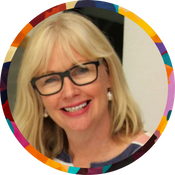
Emeritus Professor
Charles Sturt University
Australia
Emeritus Professor Whiteford has been an active contributor to occupational therapy and occupational science for three decades. She has served in clinical, managerial, research and consulting roles, including for the Department of Foreign Affairs in Australia. Her contribution to the profession has been recognised through awards from international bodies including the Canadian Association of Occupational Therapists, the Moroccan Occupational Therapy Association and Occupational Therapy Australia. She has given keynote addresses in 13 countries, including the prestigious Zemke Lecture in the USA in 2022. She was made an inaugural Fellow of the Australian Occupational Therapy Research Academy in 2017 and has an extensive publication track record.
Professionally, Gail has held a number of senior academic, executive and conjoint appointments in Australia, New Zealand and Canada and served as Australia’s first Pro Vice Chancellor of Social Inclusion. She was the Strategic Professor and Conjoint Chair of Allied Health and Community Wellbeing and was appointed by the NSW Minister of Health to a regional health district board with oversight of 7 hospitals. In 2023, Gail received the Order of Australia, the highest award available to an Australian citizen.
Doing, Being, Becoming and Belonging: Towards a Justice of Participation
Whilst the links between Doing, Being and Becoming have been explored widely to date - especially with respect to individual identity formation - the link to belonging as part of a collective has deserved less attention. These ideas will be explored and developed in the presentation with a discussion of the Participatory Occupational Justice Framework, which was originally developed by Whiteford & Townsend in 2005 and has been utilized in diverse contexts.
After participating in this session, attendees should be able to:
- Describe the relationship between Doing, Being, and Becoming in occupational therapy practice.
- Identify how Belonging contributes to participation and social connectedness.
- Summarize key features of the Participatory Occupational Justice Framework (POJF).
- Recognize at least one way the POJF can be applied to promote occupational justice in their practice setting.
J. Patrick Bowman (he/him), DMD, MS
Owner / Pediatric Dentist,
Wash Park Pediatric Dentistry
USA
With more than a decade of experience in dentistry, Dr. Patrick has the skills and know-how required to leave your kids smiling! He has a particular interest in guiding patients who are anxious or nervous about visiting their dentist’s office. He finds there is nothing more rewarding than helping a nervous child transform into one beaming with newfound confidence and pride as they leave the dental office. Dr. Patrick received special training during his residency, where he learned how to treat the unique needs of children. Dr. Patrick enjoys the puzzles that pediatric dentistry presents. He likes to figure out how to create a particular treatment plan and experience just right for each unique patient. Interested in learning more about him? Just keep reading below.
Clinical Isolation
Healthcare professionals dedicate their lives to caring for others, yet many quietly struggle with loneliness, burnout, and compassion fatigue. In this session, Dr. Patrick Bowman explores the often-overlooked emotional toll of clinical practice and how it impacts both providers and the care they deliver.
Through research and personal experience, Dr. Bowman sheds light on the difference between burnout and compassion fatigue, the role of emotional contagion in team dynamics, and practical ways to build resilience and connection. Participants will gain strategies to support their own well-being, strengthen professional relationships, and sustain the empathy that drives their work.
After participating in this session, attendees should be able to:
- Differentiate between burnout and compassion fatigue, and identify key risk factors for each within their clinical practice.
- Recognize the impact of emotional contagion on patient care, workplace culture, and personal well-being.
- Identify and apply evidence-based strategies to build resilience, set boundaries, and support emotional recovery.
- Describe strategies to promote connection and support among colleagues to reduce isolation and improve team cohesion.
Patrick Decker-Tonnesen (he/him), PhD, MSW 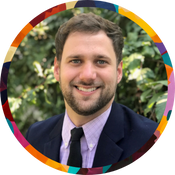
Belonging Advisor
USA
Patrick Decker-Tonnesen, Ph.D., M.S.W. (he/him) is a human resources professional and an adjunct lecturer in the School of Social Work at the University of Illinois Urbana-Champaign. Dr. Decker-Tonnesen holds a Doctorate in Social Work from Loyola University Chicago, and his research focuses on belonging and inclusion in nonprofit organizational governance systems. Dr. Decker-Tonnesen also holds a Bachelor of Science in Psychology from Mount St. Mary’s University, and a Master of Social Work, as well as certificates in Nonprofit Management & Philanthropy and Measurement & Quantitative Methods, from Loyola University Chicago.
Fadi Adel (he/him), MD 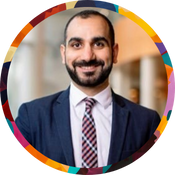
Fellow in Advanced Heart Failure and Transplant Cardiology
USA
Dr. Fadi Adel is a current fellow in Advanced Heart Failure and Transplant Cardiology in Rochester, MN. As a resident in internal medicine, he identified a need for greater LGBTQIA+ visibility in healthcare and deeper knowledge of LGBTQIA+ health issues. With support from his co-residents and residency leadership, he launched the LGBTQIA+ & Allies Residency Group. The group has incorporated educational materials, initiated community-based projects, and organized social events. It later expanded to include all fellowship training programs. This initiative has been very well received, and Dr. Adel and his colleagues continue to work toward fostering a more inclusive training environment.
Cultivating Belonging: Enhancing the LGBTQ+ Experience in Healthcare
This presentation will explore the critical importance of fostering a sense of belonging for LGBTQ+ patients within healthcare. We will examine the negative impacts of exclusion and discrimination on health outcomes, highlighting the need for inclusive practices. The presentation will then present practical strategies for healthcare providers and staff to create a more welcoming and affirming environment, focusing on the use of inclusive language, respectful communication, and culturally competent care. By emphasizing the benefits of creating a truly inclusive healthcare system for all, we aim to empower attendees to actively contribute to a more equitable and just healthcare experience.
After participating in this session, attendees should be able to:
- Identify barriers to belonging for LGBTQ+ patients in healthcare settings.
- Describe evidence-based strategies for inclusive communication and culturally competent care.
- Recognize examples of inclusive language and behaviors that promote belonging in patient interactions.
Amandine Catala (she/her), PhD 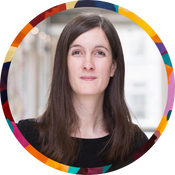
Full Professor, Canada Research Chair on Epistemic Injustice and Agency
Université du Québec à Montréal
Canada
Amandine Catala is a Full Professor in the Department of Philosophy at the University of Quebec at Montreal (UQAM), where she holds the Canada Research Chair on Epistemic Injustice and Agency (CRC-IAE) and runs the Lab for the Exploration of Epistemic Justice in Action (LEJEA). Originally from Belgium, she received her PhD in Philosophy from the University of Colorado at Boulder and was a postdoctoral fellow at the London School of Economics, the Australian National University, and the University of Louvain. She is a Senior Research Associate at the African Centre for Epistemology and Philosophy of Science at the University of Johannesburg. Her research explores the ways in which minoritized groups tend to be excluded from processes of knowledge production, exchange, and validation in various contexts, including academia and neurodiversity, and what we can do about it. Her book, The Dynamics of Epistemic Injustice: Situating Epistemic Power and Agency, was published by Oxford University Press in 2025. Amandine loves to travel, ski, hike, go for long walks, practice yoga, read, listen to podcasts, learn, laugh, and spend time with her friends and partner. She also has an incorrigible sweet tooth.
Being Seen: Why Belonging Requires Epistemic Justice
This presentation explains why belonging requires what is called ‘epistemic justice’, i.e., being taken seriously by others and having shared concepts to be able to understand and communicate your experience to others. The presentation addresses the question of belonging and epistemic justice in the context of neurodiversity. It emphasizes the need to center and take seriously the perspectives of neurodivergent people, and to rely on understandings or concepts of diagnostic categories that take into account the various ways in which neurodivergence may manifest differently across a range of demographic groups (e.g., based on gender, race, sexual orientation, and so on). If you are not taken seriously by others as a neurodivergent person, or if you are unable to recognize yourself or to be recognized by others in certain diagnostic categories because these categories are too narrowly or stereotypically defined, then you face what is called ‘epistemic injustice’ and this situation of epistemic injustice will likely prevent you from fulfilling the strong human need for community and belonging. Belonging, therefore, requires epistemic justice.
After participating in this session, attendees should be able to:
- Define and identify cases of epistemic injustice
- Describe implications for clinicians and other practitioners
- Apply actionable strategies to avoid epistemic injustice and foster belonging
